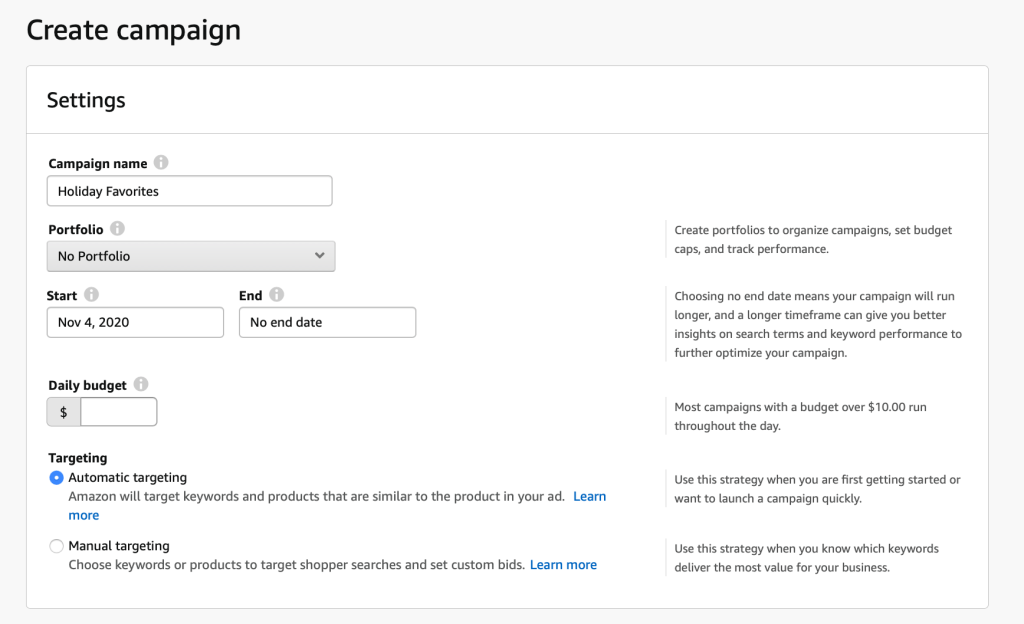Exact and Broad: Keyword Management Using 2 Powerful Types

Why using exact and broad keywords in your keyword management leads to the best results!
Part of effective search engine marketing is bidding on keywords that directly lead to sales. Keyword management is maximizing the performance of these keywords, spending advertising dollars as efficiently as possible.
The largest two search engines are Google and Amazon. Amazon is often left out of keyword management discussion because it is an e-commerce site, but for keyword management, they function similarly to Google.
This article will outline a method for tackling keyword management for both platforms using broad and exact keywords. There are numerous other methods available, many that make use of phrase match capabilities, but Algorithmic Global’s clients have seen the most success with the following strategy.
Keyword Match Types
Before diving into the nuts and bolts of keyword management, let’s lay down some definitions.
Broad, phrase and exact are the three ways search terms can match with keywords. A keyword bid is the amount of money you’re willing to spend on a word or phrase, and a search term can trigger that keyword whenever potential customers search for the item, depending on the match type.
Broad keywords include variations, plurals, and the keywords can be in any order. This type offers the loosest matches and produces the most volume.
Phrase keywords are more restrictive than broad. The keyword phrase must be in order, but some variation is allowed.
Exact keywords are what you’d expect: the search term must match the keyword.
Defining Success
The goal is conversions, or sales, whether you’re running Google or Amazon ads. The better your keyword performs in sales, the better your keyword management.
Quality, effective keyword management leverages the different match types to create a responsive ad campaign that spends money in a way you’d expect and converts at an appropriate rate for your strategy.
This strategy outlined below takes advantage of the volume of broad match type and the precision of exact.
Keyword Management
In a nutshell, this keyword management strategy aims to leverage the search engines to provide insight about customer’s search terms, then focus ad efforts on the highest performing search terms.
This method is available in both Google and Amazon, but finding the search terms via broad match types and bidding on them via exact match types looks different in each platform.
Let’s take a look at each.

Google ads keywords management
A Google ads campaign has different ad groups; each ad group is responsible for holding ads for a particular service or product.
Initial keyword management involves finding keywords to populate this ad group. Google provides this information. When making the keyword list, type in the service you wish to advertise. Google then gives you search terms customers use to find your product.
Choose ten that seem applicable to your efforts; these are your broad keywords. Once active, customers will begin clicking on your ads, and you can see the search terms they use to find your service or product.
The search terms that are most applicable to your service or product are the keywords that get added to the list as exact match types.
The benefit of this keyword management strategy is that once you have your exact keywords, you can turn off your broad keywords, leaving the most precise search terms your customers use.
Refine this exact keyword list further by measuring the conversion rate for the exact match keywords. The higher the conversion rate, the more you can spend on the keyword!

Amazon ads keyword management
Amazon ads are built similarly to Google ads in that there are campaigns and ad groups. However, in Amazon ads, each campaign is a different product, and the ad groups are various targets.
The initial keyword management for Amazon ads also requires input from the search engine. This time, it’s in the form of an automatic campaign. This automatic campaign uses your product’s description page to serve your ad to potential customers.
Whenever a sale comes in from the automatic campaign, the associated search terms get placed into two other campaigns: one for broad match types and one for exact.
This keyword management type uses three campaigns: two for research, one for sales. The automatic and broad keyword campaigns are the research campaigns, and the exact one has the highly-targeted terms your customers use when finding your product.
The campaign with broad keywords will continue finding more search terms similar to those that garnered prior sales, giving you a continuous stream of data you can input into your high-performing campaign.
Whenever you want to stop researching new search terms, turn off the research campaigns–either automatic or broad–and pour the ad dollars into the exact campaign. This plan is the keyword management that allows for the most control of your sales funnel!

What are Facebook keywords?
Facebook doesn’t have keywords in the same way as, say, Google, or Amazon. Instead, Facebook uses the terms that describe your potential customers and creates buckets of users who share that characteristic.
The people in these created audiences will see your ads. Since there are no search terms, there is no way to get a list of high-performing keywords to create another exact-match list. Managing Facebook ads turns into measuring the best performing audiences and putting your ad dollars behind that list.
What is a good keyword?
A good keyword is one that leads to a sale or conversion. A great keyword is one that leads to a lot of sales or conversions.
This definition assumes the strategy is sales or conversions. For brand awareness campaigns, the measure that defines success could be impressions or another metric based on your keyword management strategy.
Should I use a keyword tool?
Using a keyword tool can help with an initial list of keywords for the high-performance exact match type. But both Google and Amazon provide resources to generate these keywords; it just takes some time running the campaign before these keywords are unmined.
If the keyword tool in question can somehow prove it provides better results than the data from the source, consider investing in using it. If the proof isn’t there, your keyword management strategy might not need a keyword tool.
Let Algorithmic Global help
There is some time required before this keyword management strategy yields enough results to run an entire campaign on exact-match types. Your initial research with broad keywords can start right away on Google ads but requires an automatic campaign on Amazon ads.
Then, the broad keywords will trigger a large number of search terms. Keeping the best search terms as exact match keywords allows you to bid on the highest performing keywords that signal the highest degree of customer intent.
This list can be further clarified by monitoring the conversions of each of the exact keywords.
Blasting through the beginning stages with a keyword tool might seem like a good idea, but it will make keyword management more convoluted as your campaign matures. The strategy outlined above requires patience but produces excellent results for those who can stick with it.
If you are looking for Google ads or Amazon ads management services, the team at Algorithmic Global can help! We have experience with both platforms and use the data provided by these juggernauts to craft an effective, high-performing campaign. Reach out via our contact page; we’d love to hear from you.



0 Comments